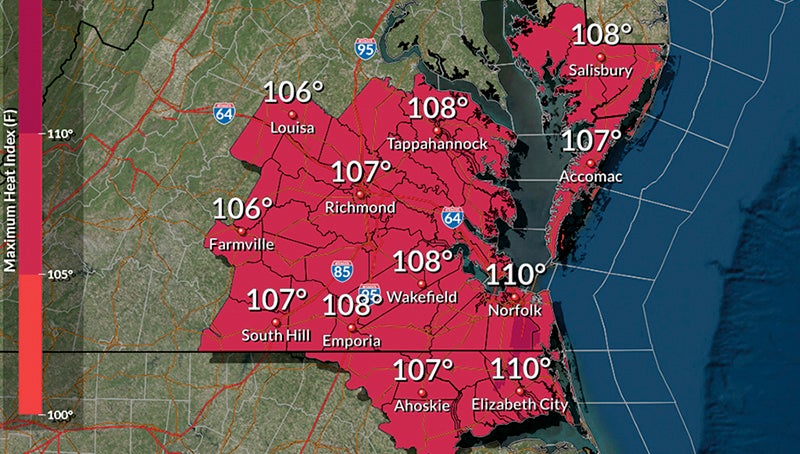Weather Warning
Published 6:26 pm Tuesday, July 16, 2019
The recent streak of consecutive days where the air temperature has been in the 90’s across the Roanoke-Chowan area isn’t expected to break until early next week.
Yesterday (Tuesday), the National Weather Service office in Wakefield, VA issued a statement regarding this heat wave and also offered safety tips for those vulnerable to these extreme temperatures.
“Heat and humidity will build today (Tuesday) through midweek, and then remain hot and humid through the weekend,” NWS-Wakefield said in its statement. “Heat indices may reach or exceed 105 degrees across interior Eastern and Southeast VA and Northeast NC in spots Wednesday and Thursday. Expect excessive heat and humidity Friday, Saturday and Sunday with widespread high temperatures in the upper 90s to around 100 degrees and heat indices of 105-110 degrees.”
NWS-Wakefield cautioned that Heat Advisories will likely be issued Friday through Sunday. Excessive Heat Warnings may be needed for at least portions of the area this weekend.
As for any type of relief, NWS-Wakefield said there is a chance of isolated to widely scattered thunderstorms on Thursday. Locally heavy rainfall and frequent lightning are likely in any storms that do develop.
The probability for thunderstorms will remain low from Friday through the weekend.
“A break down of the hot weather pattern as well as increased chances for thunderstorms may occur Monday or Tuesday of next week,” the statement revealed.
Precautions to take during this heat wave are as follows:
During extremely hot and humid weather, your body’s ability to cool itself is challenged. When the body heats too rapidly to cool itself properly, or when too much fluid or salt is lost through dehydration or sweating, body temperature rises and you or someone you care about may experience a heat-related illness.
It is important to know the symptoms of excessive heat exposure and the appropriate responses. The Centers for Disease Control and Prevention provides a list of warning signs and symptoms of heat illness, and recommended first aid steps. Some of these symptoms and steps are listed below.
Heat Exhaustion
Symptoms: Heavy sweating, weakness cool, pale, clammy skin, fast, weak pulse, possible muscle cramps, dizziness nausea or vomiting, and fainting
First Aid: Move person to a cooler environment, lay them down and loosen clothing, apply cool, wet cloths to as much of the body as possible, fan or move victim to air conditioned room, and offer sips of water. If person vomits more than once, seek immediate medical attention.
Heat Stroke
Symptoms: Altered mental state, one or more of the following – throbbing headache, confusion, nausea, dizziness, and/or shallow breathing – body temperature above 103 degrees, hot, red, dry or moist skin, rapid and strong pulse and, faints or loses consciousness
First Aid: Heat stroke is a severe medical emergency. Call 911 or get the victim to a hospital immediately. Delay can be fatal. Move the victim to a cooler, preferably air-conditioned, environment. Reduce body temperature with cool cloths or bath. Use fan if heat index temperatures are below the high 90s. A fan can make you hotter at higher temperatures. Do NOT give fluids.
Heat Safety for
Outdoor Workers
Outdoor workers can be at a higher risk to the effects of excessive heat. See Occupational Safety and Health Administration (OSHA) resources and recommended practices when working under hot conditions.
Other advice for those working outdoors include taking frequent water breaks, rest and cool down in the shade during breaks, gradually increase workload and allow more frequent breaks for new workers or workers who have been away for a week or more, know symptoms, prevention, and emergency response to prevent heat-related illness and death, and check weather forecasts ahead of time to be better prepared.
Safety Tips
for Parents
Even on mild days in the 70s, studies have shown that the temperature inside a parked vehicle can rapidly rise to a dangerous level for children, pets and even adults. Leaving the windows slightly open does not significantly decrease the heating rate. The effects are more severe on children because their bodies warm at a faster rate than adults.
A dark dashboard or carseat can quickly reach temperatures in the range of 180°F to over 200°F. These objects heat the adjacent air by conduction and convection and also give off long wave radiation, which then heats the air trapped inside a vehicle. Follow these tips to ensure your child’s safety:
Touch a child’s safety seat and safety belt before using it to ensure it’s not too hot before securing a child.
Never leave a child unattended in a vehicle, even with the windows down, even for just a minute.
Teach children not to play in, on, or around cars. They could accidentally trap themselves in a hot vehicle.
Always lock car doors and trunks–even at home–and keep keys out of children’s reach.
Always make sure children have left the car when you reach your destination. Don’t leave sleeping infants in the car ever.
Pet owners are also advised to take precautions for their domestic animals during extended periods of extreme heat.
The ASPCA says that pets can get dehydrated quickly, so give them plenty of fresh, clean water when it’s hot or humid outdoors. Make sure your pets have a shady place to get out of the sun, be careful not to over-exercise them, and keep them indoors when it’s extremely hot.
Know the symptoms of overheating in pets, which include excessive panting or difficulty breathing, increased heart and respiratory rate, drooling, mild weakness, stupor or even collapse. Symptoms can also include seizures, bloody diarrhea and vomit along with an elevated body temperature of over 104 degrees.
For the latest updates on the current heatwave, visit the National Weather Service’s website or on Twitter @NWSWakefieldVA or facebook.com/NWSWakefieldVA



